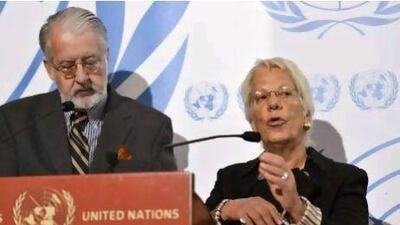AMSTERDAM // If Bashar Al Assad and other combatants in Syria do not know the name Carla Del Ponte, they soon might.
She is the outspoken former prosecutor at the International Criminal Tribunal for the former Yugoslavia (ICTY) in The Hague, who has vowed to seek those responsible for human-rights violations in the Syrian civil war.
She gained a reputation as a dogged investigator and a political bruiser investigating the crimes of the former Yugoslavia.
Amid increasingly dire reports from Syria on likely war crimes, Ms Del Ponte joined the UN's Syria investigation at the end of September. The work of the Independent International Commission of Inquiry, mandated by the UN's Human Rights Council in Geneva and headed by Brazilian expert on human-rights abuses, Paulo Pinheiro, is gaining added urgency.
"My main task will be to continue the inquiry in the direction of determining the high-ranking political and military authorities responsible for these crimes," Ms Del Ponte said.
The inclusion of Ms Del Ponte could signal the wish of a large part of the international community to prepare for the prosecution of those responsible for war crimes in Syria.
"She will be a good asset for the commission to collect the information in case that one day they go further into a classical legal investigation for the purpose of prosecution, which is not the profile of all members," Florence Hartmann, for many years Ms Del Ponte's spokeswoman in The Hague, said.
Ms Del Ponte is 65. She built her reputation in her native Switzerland, first where she antagonised many in the country's powerful banking industry by going after illegal funds in secret bank accounts.
In the 1980s, she joined forces with the famed Italian mafia hunter Giovanni Falcone in tracking down hiding places for mafia money. Falcone was assassinated in Sicily in 1992. Both the cooperation with Falcone and his death shaped her career, she later said.
Ms Del Ponte wrote in her 2008 memoir Madame Prosecutor, how proud she was when Falcone called her "the embodiment of stubbornness", a reputation that she has burnished over time. As she continued her mafia investigations, she received many threats to her life leading Ms Del Ponte to become the first Swiss prosecutor who was given 24-hour police protection.
She made it to the top of Switzerland's judicial system, becoming the country's attorney general in 1994, before being appointed chief prosecutor for the both the Yugoslavia tribunal and the International Criminal Tribunal for Rwanda in 1999.
Ms Del Ponte was not only the Yugoslavia tribunal's longest serving prosecutor at eight years in the job, she was also the most controversial. During her tenure, the highest-ranking figure in the Yugoslavia conflict, former president Slobodan Milosevic, was put on trial only to die before a verdict was reached. Despite her repeated urgings, main suspects, such as Bosnian Serb general Ratko Mladic and his political boss, Radovan Karadzic, were only arrested after she left office.
She antagonised political leaders, international law enforcement officers and even many of her own staff, some of whom even now express resentment at her style and her tactics, although they refuse to do so openly.
International law expert at the University of Amsterdam Goran Sluiter, who has written books about the ICTY and who has acted as an adviser for the defence at the tribunal, said, "There was some internal criticism but of course if someone is a bit stricter, she'll get criticised. She had a clear role, not in the courtroom, she left that to her assistants, but her mission was to get the cooperation going."
In her memoir, she acknowledges that her constant pushing, cajoling and even threatening with negative publicity rubbed many the wrong way. "I strived to serve justice by obtaining cooperation from people who in too many instances did not want to cooperate and felt relatively little imperative to do so."
In one example, she recounts a meeting with George Tenet, the CIA director on whose watch the events of September 11, 2011 unfolded, where she castigated him for not coming through on promises to help track down Yugoslav war criminals. "Look, Madame, I don't give a s*** what you think," she records his response.
Ms Hartmann, who covered the wars on the Balkans as a journalist, defends her old boss against many of the accusations. "At one point when it doesn't work as when no one is looking for fugitives, for instance, and you use the support of the public opinion then you make people not happy," she said.
The episode contributed both to her reputation as a committed war crimes investigator and as being blunt and outspoken. Apart from putting Serb suspects on trial, she also pursued Bosnians and Croatians who were accused of war crimes.
In the case of Rwanda, where she insisted on investigating both sides in the conflict that led to the 1994 genocide may be something for Syria's opposition forces to ponder. Ms Del Ponte has made a habit of such equal opportunity investigations, often in the face of furious international opposition.
After stepping down as prosecutor in 2007, she caused howls of international outrage when in her book she accused Kosovo's leadership of involvement in the trafficking of human organ's harvested from captured Serbs. Now an international investigation is looking into the allegations.
With the Syria investigation, Ms Del Ponte has only just started.

